Kia Sportage: Purge Control Solenoid Valve (PCSV)
Description and Operation
Description
Purge Control Solenoid Valve (PCSV) is installed on the surge tank and controls the passage between the canister and the intake manifold. It is a solenoid valve and is open when the ECM grounds the valve control line. When the passage is open (PCSV ON), fuel vapor stored in the canister is transferred to the intake manifold.
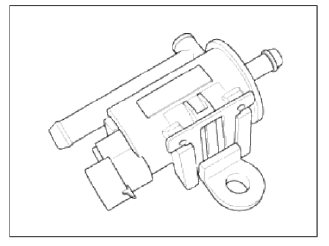
Specifications
Specification

Schematic Diagrams
Circuit Diagram
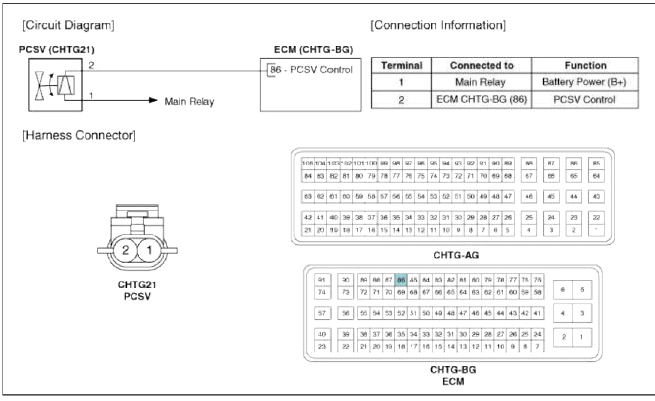
Repair procedures
Inspection
1. Turn the ignition switch OFF.
2. Disconnect the PCSV connector.
3. Measure resistance between the PCSV terminals 1 and 2.
4. Check that the resistance is within the specification.
Specification: Refer to "Specification"
Removal
1. Turn the ignition switch OFF and disconnect the battery negative (-) cable.
2. Disconnect the purge control solenoid valve connector (A).
З. Disconnect the vapor hoses (B) from the purge control solenoid valve.
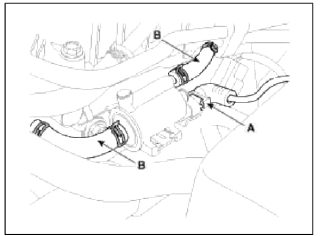
4. Remove the valve from the bracket in the direction of the arrow.
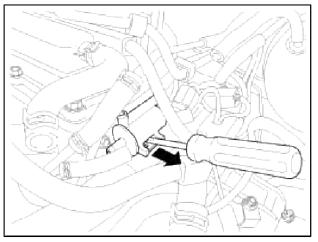
Installation
CAUTION
- Install the component with the specified torques.
- Note that internal damage may occur when the component is dropped. If the component has been dropped, inspect before installing.
CAUTION
- Use care to keep foreign material out of the valve.
CAUTION
- Install the purge control solenoid valve after lifting the support pin (A) of the bracket.
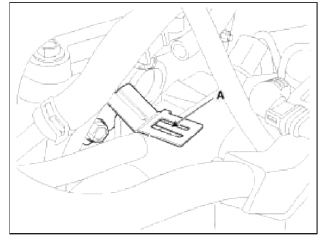
1. Installation is reverse of removal.
Purge control solenoid valve bracket installation bolt: 9.8 ~ 11.8 N.m (1.0 ~1.2 kgf.m, 7.2 ~ 8.7 lb-ft)
READ NEXT:
 CVVT Oil Control Valve (OCV)
CVVT Oil Control Valve (OCV)
Description and Operation
Description
Continuous Variable Valve Timing (CWT) system advances or retards the valve
timing of the intake and exhaust
valve in accordance with the ECM control s
 Fuel Pressure Control Valve | Electric WGT Control Actuator
Fuel Pressure Control Valve | Electric WGT Control Actuator
Description and Operation
Description
Fuel Pressure Regulator Valve is installed on the high pressure fuel pump and controls fuel flow flowing into the injectors in accordance with the ECM si
SEE MORE:
 Components and Components Location | Compressor Oil
Components and Components Location | Compressor Oil
Component Location Index
Engine Room
Condenser
Receiver-drier
Compressor
Expansion Valve
Service port (High)
Service port (Low)
Ð/С Pressure
Transducer
Interior
Compressor Oil
Repair procedures
Oil Specification
1. The HFC-134a system
 Passenger Airbag (PAB) Module
Passenger Airbag (PAB) Module
Description and Operation
Description
The passenger airbag (PAB) is installed inside the crash pad and protects the
front passenger in the event of a frontal
crash. The SRS CM determines if and when to deploy the PAB.
CAUTION
Never attempt to measure the circuit resistance of the air ba
Content
- Home
- Kia Sportage - Fifth generation (NQ5) - (2022-2026) - Owner's Manual
- Kia Sportage - Second generation (JEKM) (2005-2015) - Body Workshop Manual
- Kia Sportage Third generation (SL) - (2011-2016) - Service and Repair Manual
- Sitemap
- Top articles